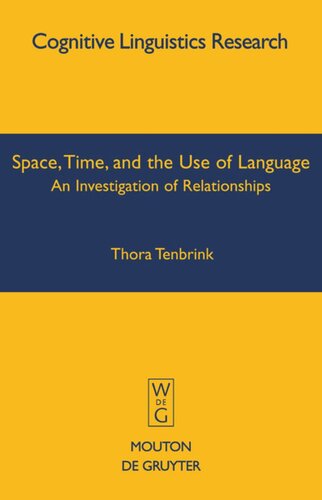

Most ebook files are in PDF format, so you can easily read them using various software such as Foxit Reader or directly on the Google Chrome browser.
Some ebook files are released by publishers in other formats such as .awz, .mobi, .epub, .fb2, etc. You may need to install specific software to read these formats on mobile/PC, such as Calibre.
Please read the tutorial at this link: https://ebookbell.com/faq
We offer FREE conversion to the popular formats you request; however, this may take some time. Therefore, right after payment, please email us, and we will try to provide the service as quickly as possible.
For some exceptional file formats or broken links (if any), please refrain from opening any disputes. Instead, email us first, and we will try to assist within a maximum of 6 hours.
EbookBell Team

4.7
56 reviewsDoes temporal language depend on spatial language? This widespread view is intuitively appealing since spatial and temporal expressions are often similar or identical. Also, metaphors consistently express temporal phenomena in terms of spatial language, pointing to a close semantic and conceptual relationship. But what about the application of the two kinds of linguistic expressions in natural discourse?
The book draws together findings on terms that describe the relation of objects or events to each other (such as in front / behind, before / after, etc.), highlighting the relationship between cognition and language usage. Using the method of cognitively motivated discourse analysis, novel empirical results are presented to complement earlier findings. The detailed investigation of a selected range of terms that appear to be parallel in space and time highlights both similarities and fundamental differences in their application. As a result, a new picture emerges: The concepts of space and time are represented in language usage in various systematic ways, reflecting how we understand the world - and at the same time reflecting how our concepts of space and time differ fundamentally.
The volume contributes to a debate that has been of interest for cognitive linguists for several decades, concerning the understanding of transfer processes between two conceptually intertwined domains. The specific contribution of this work consists of addressing the novel question of how such processes come into play in the actual application of relevant expressions in natural discourse. By adopting established approaches from Discourse Analysis for issues that are deeply rooted in interdisciplinary research in Cognitive Science, insights are drawn together from two hitherto largely unrelated fields of research to approach the topic from an original perspective, leading to a deeper understanding of the relationship between the domains of space and time and their expression in language.